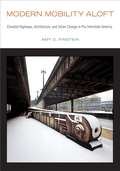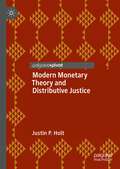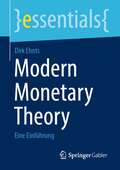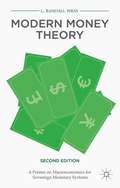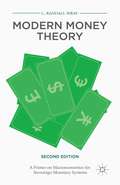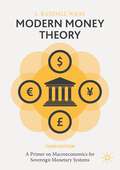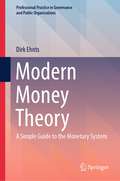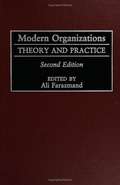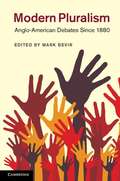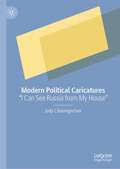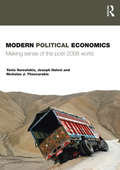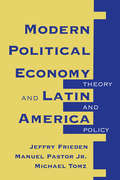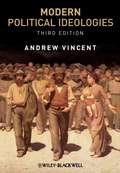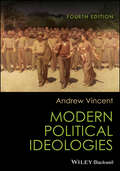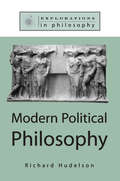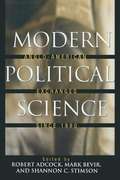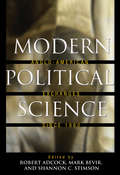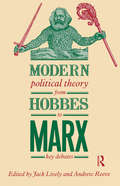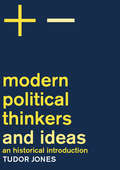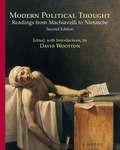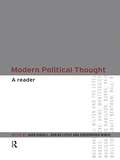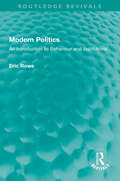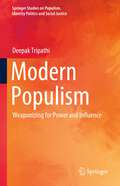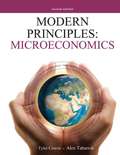- Table View
- List View
Modern Mobility Aloft: Elevated Highways, Architecture, and Urban Change in Pre-Interstate America (Urban Life, Landscape and Policy #84)
by Amy D. FinsteinIn the first half of the twentieth century, urban elevated highways were much more than utilitarian infrastructure, lifting traffic above the streets; they were statements of civic pride, asserting boldly modern visions for a city’s architecture, economy, and transportation network. Yet three of the most ambitious projects, launched in Chicago, New York, and Boston in the spirit of utopian models by architects such as Le Corbusier and Hugh Ferriss, ultimately fell short of their ideals. Modern Mobility Aloft is the first study to focus on pre-Interstate urban elevated highways within American architectural and urban history. Amy Finstein traces the idealistic roots of these superstructures, their contrasting realities once built, their impacts on successive development patterns, and the recent challenges they have posed to contemporary urban designers. Filled with more than 100 historic photographs and illustrations of beaux arts and art deco architecture, Modern Mobility Aloft provides a critical understanding of urban landscapes, transportation, and technological change as cities moved into the modern era.
Modern Mobility Aloft: Elevated Highways, Architecture, and Urban Change in Pre-Interstate America (Urban Life, Landscape and Policy #84)
by Amy D. FinsteinIn the first half of the twentieth century, urban elevated highways were much more than utilitarian infrastructure, lifting traffic above the streets; they were statements of civic pride, asserting boldly modern visions for a city’s architecture, economy, and transportation network. Yet three of the most ambitious projects, launched in Chicago, New York, and Boston in the spirit of utopian models by architects such as Le Corbusier and Hugh Ferriss, ultimately fell short of their ideals. Modern Mobility Aloft is the first study to focus on pre-Interstate urban elevated highways within American architectural and urban history. Amy Finstein traces the idealistic roots of these superstructures, their contrasting realities once built, their impacts on successive development patterns, and the recent challenges they have posed to contemporary urban designers. Filled with more than 100 historic photographs and illustrations of beaux arts and art deco architecture, Modern Mobility Aloft provides a critical understanding of urban landscapes, transportation, and technological change as cities moved into the modern era.
Modern Monetary Theory and Distributive Justice
by Justin P. HoltModern Monetary Theory and Distributive Justice shows how the macroeconomic framework called modern money theory (MMT) is relevant to the field of political philosophy called distributive justice. Many of the macroeconomic assumptions of distributive justice are unstated and unexamined. The framework of MMT illuminates these assumptions and provides an alternative vision of distributive justice analysis and prescriptions. In particular, MMT holds that modern money is a nominal state issued token (fiat), there is a distinction between nominal assets and real assets, that state money as a nominal token can cause changes in real terms, and that the macroeconomy has historically not operated at capacity. The upshot of these assumptions held by MMT is that state spending can bring about changes in persons’ well-being without traditional redistributive measures via taxation. This is in contradistinction to standard assumptions in the distributive justice literature, which holds that the macroeconomy is at capacity and, thus, redistribution is the necessary mechanism for enacting improvements in well-being. This is a fundamental shift in how distributive justice can be conceived.
Modern Monetary Theory: Eine Einführung (essentials)
by Dirk EhntsDieses essential erläutert, wie Zentralbanken, Banken und Regierungen Geld schöpfen. Bei modernem Geld handelt es sich letztlich um eine Steuergutschrift, die der Staat über seine Zentralbank als Monopolist ausgibt. Daher gibt es kein „Steuerzahler-Geld“ (Thatcher 1983) und „Staatsschulden“ sind lediglich Geld im Besitz der Bürger*innen, welches für spätere Steuerzahlungen verwendet werden kann. Preisstabilität, Vollbeschäftigung und nachhaltige Ressourcennutzung ergeben sich nicht von allein. Der Einsatz von Wirtschaftspolitik zur Erreichung dieser Ziele wird beschrieben.
Modern Money Theory: A Primer on Macroeconomics for Sovereign Monetary Systems
by L. Randall WrayModern Money Theory.
Modern Money Theory: A Primer on Macroeconomics for Sovereign Monetary Systems
by L. Randall WrayThis second edition explores how money 'works' in the modern economy and synthesises the key principles of Modern Money Theory, exploring macro accounting, currency regimes and exchange rates in both the USA and developing nations.
Modern Money Theory: A Primer on Macroeconomics for Sovereign Monetary Systems
by L. Randall WrayThis book, a revised new edition, examines how money is created and how it functions within global exchange rate regimes to highlight how monetary policy can promote economic growth, full employment, and price stability. It provides an introduction to the basics of macroeconomic accounting and the domestic monetary system, as well as fiscal operations, tax policy for sovereign nations, alternative exchange rate regimes. New topics, including central bank clearing, responses to the COVID-19 pandemic, the rise of inflation, and how to finance a Green New Deal, are also discussed. Modern Money Theory provides the reader with a framework for understanding real world economies. It will be relevant to students, researchers, and policymakers interested in monetary policy.
Modern Money Theory: A Simple Guide to the Monetary System (Professional Practice in Governance and Public Organizations)
by Dirk EhntsThis book explains how central banks, banks and governments create money. Written in an accessible style, this book provides an introduction to modern monetary theory without requiring any prior knowledge of economics. It covers the most important aspects of monetary theory, including inflation targeting, government spending, and international trade, as well as economic policy to achieve macroeconomic goals, such as price stability, full employment and sustainable use of resources. Accordingly, it offers a valuable asset for students of economics, central bankers, banking professionals, and academics alike.
Modern Organizations: Theory and Practice (2nd Edition)
by Ali Farazmand<p>Farazmand and his contributors examine modern organization theory and behavior. They view organization in two ways: As an organization of society into public, private, and nonprofit sectors, and they examine the power structure and those power elites who determine policy choices and outcomes. They also look at organizing activity, such as creating institutional arrangements to perform certain functions or tasks, as well as organizational entities of all sizes. <p>Using a balanced approach to analyze modern organizations' managerial expectations and individual/citizen expectations and demands, the book presents a succinct analysis of theoretical and conceptual perspectives on modern organizations, their management, and their interactions with other organizations in an environment that is becoming increasingly global and integrated worldwide. Although all organizations are covered, the emphasis is placed mainly on public organizations. The book also addresses key issues of organizational change, reform, and reorganization of governments in both theoretical and empirical ways. A key text and handbook for scholars, students, researchers, and practitioners of public administration and the management of nonprofit organizations.
Modern Pluralism
by Mark BevirPluralism is among the most vital intellectual movements of the modern era. Liberal pluralism helped reinforce and promote greater separation of political and religious spheres. Socialist pluralism promoted the political role of trade unions and the rise of corporatism. Empirical pluralism helped legitimate the role of interest groups in democratic government. Today pluralism inspires thinking about key issues such as multiculturalism and network governance. However, despite pluralism's importance, there are no histories of twentieth-century pluralist thinking. Modern Pluralism fills this gap. It explores liberal, socialist, and empirical ideas about diversity in Britain and the United States. It shows how pluralists challenged homogenous nations and sovereign states, often promoting sub-national groups as potential sites of self-government. In it, intellectual historians, political theorists, and social scientists collectively explore the historical background to present institutions and debates. The book serves to enrich our understanding of the history of pluralism and its continuing relevance.
Modern Political Caricatures: "I Can See Russia from My House"
by Jody C BaumgartnerPolitical humor has an extensive record in the United States, replete with examples of humorists and satirists lampooning political leaders, institutions, ideas and more. Dating back to at least before the beginning of the republic, satirists often ridiculed often ridiculed British leaders and policies as well colonial leaders. Thomas Nast’s cartoons about Boss Tweed are credited with helping bring down the infamous Tammany Ring. Mark Twain never tired of making jokes about Congress and its members. And contemporary late night talk show hosts of regularly lampoon political figures. This book examines humorous depictions of political leaders in the television era. The book is divided into two parts, the first focusing on presidents, the second on vice presidents, presidential, and vice-presidential candidates. The book highlights the comedic and satirical characterizations of these political leaders presented on Saturday Night Live, various late night talk shows, other television programs (e.g., the HBO series Veep), The Onion, YouTube videos, editorial cartoons, and more. Both humorous and informative, this book allows readers to learn more about the leaders examined within and how they acquired their popular reputations and how their careers were impacted. It also sheds light on how political humor, both political comedy and political satire, function in the modern era.
Modern Political Economics: Making Sense of the Post-2008 World
by Yanis Varoufakis Joseph Halevi Nicholas TheocarakisOnce in a while the world astonishes itself. Anxious incredulity replaces intellectual torpor and a puzzled public strains its antennae in every possible direction, desperately seeking explanations for the causes and nature of what just hit it. 2008 was such a moment. Not only did the financial system collapse, and send the real economy into a tailspin, but it also revealed the great gulf separating economics from a very real capitalism. Modern Political Economics has a single aim: To help readers make sense of how 2008 came about and what the post-2008 world has in store. The book is divided into two parts. The first part delves into every major economic theory, from Aristotle to the present, with a determination to discover clues of what went wrong in 2008. The main finding is that all economic theory is inherently flawed. Any system of ideas whose purpose is to describe capitalism in mathematical or engineering terms leads to inevitable logical inconsistency; an inherent error that stands between us and a decent grasp of capitalist reality. The only scientific truth about capitalism is its radical indeterminacy, a condition which makes it impossible to use science's tools (e.g. calculus and statistics) to second-guess it. The second part casts an attentive eye on the post-war era; on the breeding ground of the Crash of 2008. It distinguishes between two major post-war phases: The Global Plan (1947-1971) and the Global Minotaur (1971-2008). This dynamic new book delves into every major economic theory and maps out meticulously the trajectory that global capitalism followed from post-war almost centrally planned stability, to designed disintegration in the 1970s, to an intentional magnification of unsustainable imbalances in the 1980s and, finally, to the most spectacular privatisation of money in the 1990s and beyond. Modern Political Economics is essential reading for Economics students and anyone seeking a better understanding of the 2008 economic crash.
Modern Political Economy And Latin America: Theory And Policy
by Jeffry A FriedenThis is a reader that applies the newest debates in political economy to the analysis of Latin America in a way that is thematically and theoretically cohesive.. Modern Political Economy and Latin America consists of carefully selected, edited readings in Latin American political economy. The editors, Jeffry Frieden and Manuel Pastor, Jr., include an introductory chapter, and a concluding article as well as brief introductions to all sections. These inclusions will make explicit the theoretical underpinnings of each article, and will highlight their respective contributions to the ongoing debates in Latin America. } Modern Political Economy and Latin America consists of carefully selected, edited readings in Latin American political economy. The editors, Jeffry Frieden and Manuel Pastor, Jr., include an introductory chapter, and a concluding article as well as brief introductions to all sections. These inclusions will make explicit the theoretical underpinnings of each article, and will highlight their respective contributions to the ongoing debates in Latin America.Latin American economies are undergoing profound transformations. And, in the wake of a decade-long debt crisis, the statist models of the past are giving way to a reliance on the market even as authoritarian rule seems to have ebbed in favor of new or reborn democratic institutions. As a result, the policy framework guiding economic and political development is likely to be fundamentally different. The analysis of Latin America needs a strong dose of modern political economy--one that can bring the area studies field up to date with the recent developments on the theoretical end of the economics and political science professions. This book helps fill that need. }
Modern Political Ideologies
by Andrew VincentThoroughly revised and updated, this third edition provides a comprehensive account of the major political ideologies of the past two centuries. Provides an expanded and thoroughly updated account of themajor political ideologies of the past two centuries, includingliberalism, conservatism, socialism, anarchism, fascism, feminism,environmentalism, and nationalism Features a brand new chapter on fundamentalism, along withgreater emphasis on the global impact of ideologies in general Examines the complex overlap and interplay of ideas that existboth within and between ideologies Incorporates the newest developments and scholarship in thefield, and includes a helpful new glossary of key terms
Modern Political Ideologies
by Andrew VincentMODERN POLITICAL IDEOLOGIES Modern Political Ideologies provides a broad overview of the origins, development, and core principles of the major political ideologies of the past two centuries. With an accessible, student-friendly format, this bestselling textbook helps students understand the values, beliefs, and social forces that shape today’s political messaging, public discourse, and legislative agendas. Concise and approachable chapters describe ideologies such as liberalism, conservatism, socialism, fascism, fundamentalism, and nationalism. Retaining the student-friendly format of previous editions, the fourth edition of Modern Political Ideologies is fully revised to reflect the social changes that inform today’s political views. An entirely new chapter offers insights into the growth of populism and its effects on contemporary political dialogue, while expanded material addresses anarchism, feminism, neoliberalism, environmentalism and “green” ideologies, identity politics, and other topics of current relevance. Containing a useful glossary of key terms and extensive end notes for each chapter, Modern Political Ideologies, Fourth Edition is the ideal textbook for advanced undergraduate courses in political science, political ideology, political theory, comparative politics, and international relations. It is also an excellent supplement for courses in the social sciences and humanities that investigate the history of political ideas.
Modern Political Philosophy
by Richard HudelsonAn introduction to the topics and issues in political philosophy, from the Enlightenment to Postmodernism. The author presents both the historical background of, and a systematic discussion of contemporary issues relating to the major traditions within political philosophy.
Modern Political Science: Anglo-American Exchanges Since 1880
by Mark Bevir Robert Adcock Shannon C. StimsonSince emerging in the late nineteenth century, political science has undergone a radical shift--from constructing grand narratives of national political development to producing empirical studies of individual political phenomena. What caused this change? Modern Political Science--the first authoritative history of Anglophone political science--argues that the field's transformation shouldn't be mistaken for a case of simple progress and increasing scientific precision. On the contrary, the book shows that political science is deeply historically contingent, driven both by its own inherited ideas and by the wider history in which it has developed. Focusing on the United States and the United Kingdom, and the exchanges between them, Modern Political Science contains contributions from leading political scientists, political theorists, and intellectual historians from both sides of the Atlantic. Together they provide a compelling account of the development of political science, its relation to other disciplines, the problems it currently faces, and possible solutions to these problems. Building on a growing interest in the history of political science, Modern Political Science is necessary reading for anyone who wants to understand how political science got to be what it is today--or what it might look like tomorrow.
Modern Political Science: Anglo-American Exchanges since 1880
by Robert Adcock & Mark Bevir & Shannon C. StimsonSince emerging in the late nineteenth century, political science has undergone a radical shift--from constructing grand narratives of national political development to producing empirical studies of individual political phenomena. What caused this change? Modern Political Science--the first authoritative history of Anglophone political science--argues that the field's transformation shouldn't be mistaken for a case of simple progress and increasing scientific precision. On the contrary, the book shows that political science is deeply historically contingent, driven both by its own inherited ideas and by the wider history in which it has developed. Focusing on the United States and the United Kingdom, and the exchanges between them, Modern Political Science contains contributions from leading political scientists, political theorists, and intellectual historians from both sides of the Atlantic. Together they provide a compelling account of the development of political science, its relation to other disciplines, the problems it currently faces, and possible solutions to these problems. Building on a growing interest in the history of political science, Modern Political Science is necessary reading for anyone who wants to understand how political science got to be what it is today--or what it might look like tomorrow.
Modern Political Theory from Hobbes to Marx: Key Debates
by Andrew Reeve Jack LivelyThis anthology offers students a carefully edited selection of the most influential and enduring interpretations of key political theorists. There are sections on Hobbes, Locke, Rousseau, Burke, Bentham, Mill and Marx. Each section includes classic articles by leading critics, a substantial introduction by the editors, and a guide to further reading. A general introduction to the volume as a whole is also provided. This is an up-to-date and extensive guide to the key issues at stake in the interpretative debate, and it provides an invaluable text for students and teachers of modern political thought.
Modern Political Thinkers and Ideas: An Historical Introduction
by Tudor JonesModern Political Thinkers and Ideas is an exciting new text that provides students with a clearly presented introduction to some of the key areas of modern political thought. Uniquely combining historical and philosophical approaches to the subject, it describes the writings and ideas of the most influential thinkers of the modern era.Modern Political Thinkers and Ideas features:* the main concepts in modern political theory such as: the State and Sovereignty; Political Obligation and Civil Disobedience; Liberty; Rights; Equality and Justice; Democracy* the ideas of key thinkers such as: Machiavelli; Hobbes; Locke; Paine; Rousseau; Burke; Mill; Bentham; Marx; Rawls; Hayek* a clear and instructive framework for each chapter which provides students with: (a) the significance of each concept in modern political thought; (b) what major political thinkers had to say about each concept; and (c) the relevance of key concepts to contemporary argument and debate.
Modern Political Thought (Second Edition): Readings From Machiavelli to Nietzsche
by David Wootton<P>This reader provides an introduction to modern political philosophy from Machiavelli (1513) to Nietzsche (1887). <P>Most of the works reprinted here have long been recognized as central to the history of political philosophy: Machiavelli, Hobbes, Locke, Rousseau, Mill.
Modern Political Thought: A Reader
by Christopher Winch John Gingell Adrian LittleModern Political Thought: A Reader is an excellent introduction to the key works of the major political thinkers from the English Civil War to the end of the 19th Century. It draws together the most important parts of seminal works of political thought such as Hobbes' Leviathan, Locke's Treatises, Rousseau's The Social Contract, Mill's On Liberty, together with substantial extracts from Machiavelli's The Prince and Marx's Capital. Accessible introductions are provided for each thinker, explaining their lives and works, and placing them in the historical context in which they worked and wrote.
Modern Politics: An Introduction to Behaviour and Institutions (Routledge Revivals)
by Eric RoweModern Politics (1969) is an introductory study of politics, with an emphasis on politics as a study in which the work particularly of sociologists and psychologists is increasingly relevant. It reflects the transfer of political study away from politics as the description and evaluation of ‘legal’ governments and their policies, towards politics as the study of the behaviour of individuals and groups who participate in the making and execution of public policy.
Modern Populism: Weaponizing for Power and Influence (Springer Studies on Populism, Identity Politics and Social Justice)
by Deepak TripathiThis book sheds light on modern populism and discusses the link between populism and identity politics against the backdrop of populist leaders asserting the identity of their own group, while maintaining the separation from others. Written by former BBC correspondent and commentator Deepak Tripathi, the book explains how populism has a long history with early discernable origins in the Tsarist Russian Empire and North America in the nineteenth century, spreading to Latin America, Europe, and elsewhere in the following century. The book analyzes various forms of populism, its causes and consequences. It further looks at how industrialization, economic growth, and movement of people led to conditions which contributed to inequalities, fueling populist sentiments and social conflict around the globe. Tripathi concludes that populism has moved from the fringes to the mainstream of politics, and is here to stay, given factors such as growing competition for resources, population increase, climate change, and migration. The book will appeal to students, scholars, and researchers of political science and neighboring disciplines, as well as policy-makers interested in a better understanding of modern populism and its roots. Written in a graceful, informative style, this book explores the rise of populism on the global scene and exposes its dangers. Mark Juergensmeyer, Distinguished Professor Emeritus of Sociology and Global Studies, University of California, Santa Barbara, and author of Global Rebellion: Religious Challenges to the Secular State Deepak Tripathi provides the first lucid and comprehensive analysis of a political phenomenon that engulfs many states and societies today. Ilan Pappe, Professor of History, and Director of the European Centre for Palestine Studies, University of Exeter This wide-ranging and clear-sighted book gives a historically-informed account of how populism went mainstream. It is a fascinating read. Richard Toye, Professor of Modern History, University of Exeter
Modern Principles: Microeconomics (Second Edition)
by Tyler Cowen Alex TabarrokThe book explains how markets generate cooperation from people across the world, how prices act as signals and coordinate appropriate responses to changes in economic conditions, and how profit maximization leads to the minimization of industry costs.
